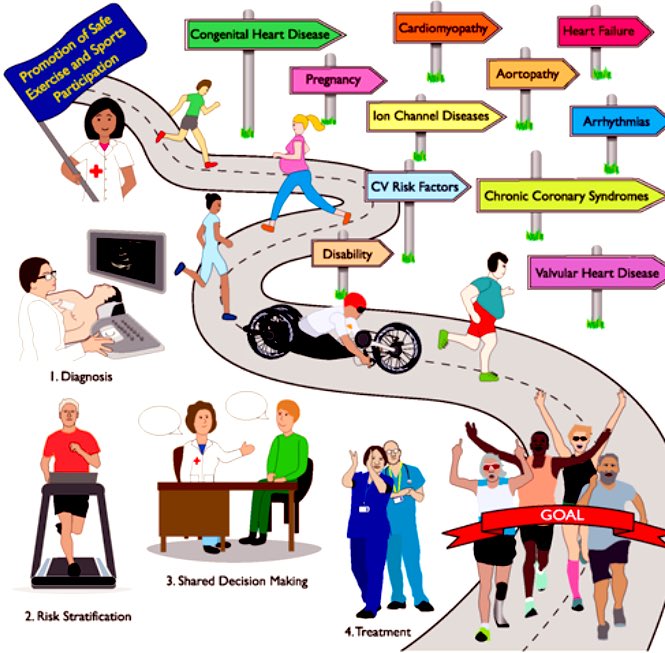‘Although proportionately scarce, exercise may paradoxically trigger sudden cardiac arrest in individuals with #cardiovascular disease (CVD), particularly those who were previously sedentary or have advanced CVD.’
‘In parallel with the drive to promote #exercise in all individuals, physicians will be confronted with an increasing number of enquiries from individuals with established risk factors for coronary artery disease or established CVD about participation in exercise‘
‘Such consultations need to strike a balance between the multiple benefits of #exercise, the small risk of sudden death, and the patient’s goals for cardiorespiratory fitness & ongoing participation in relatively strenuous exercise following a #cardiovascular diagnosis.’
2020 ESC Guidelines on sports cardiology and #exercise in patients with #cardiovascular disease: #ESCCongress https://academic.oup.com/eurheartj/advance-article/doi/10.1093/eurheartj/ehaa605/5898937#.X03lUdcqZYg.twitter">https://academic.oup.com/eurheartj...
‘Moderate physical activity should be promoted in all individuals with #cardiovascular disease. Appropriate risk stratification & optimal therapy are essential for providing #exercise prescription for more vigorous activity.’
‘Individuals should be involved in the decision making process & a record of the discussion & #exercise plan should be documented in the medical records.’
‘Higher levels of physical activity & #fitness are associated with lower all-cause mortality, lower rates of #cardiovascular disease, & lower prevalence of several known malignancies.’
‘Despite the substantial #health benefits provided by regular physical activity, intense #exercise may paradoxically act as a trigger for life-threatening ventricular arrhythmias in the presence of underlying #cardiovascular disease.’
‘Pre-participation #cardiovascular screening aimed at the detection of disorders associated with sudden cardiac death is universally supported by major medical societies.’
‘However, the best method for screening of young competitive #athletes (<35 years old) remains controversial, & limited data are available to guide recommendations in master athletes (≥35 years old).’
2020 ESC Guidelines on sports cardiology and exercise in patients with cardiovascular disease: #ESCCongress https://academic.oup.com/eurheartj/advance-article/doi/10.1093/eurheartj/ehaa605/5898937#.X03lUdcqZYg.twitter">https://academic.oup.com/eurheartj...
‘The exercise test also permits an assessment of any abnormal #cardiovascular responses that might not otherwise be apparent during usual daily activities (including symptoms, ECG abnormalities, arrhythmias, or abnormal BP response).’
‘Based on the #exercise testing results, the physician may indicate the intensity, mode, & duration of exercise that appears most suitable to the individual patient’
‘Guidelines recommend healthy adults perform a minimum of 150min of moderate-intensity endurance #exercise over 5 days or 75min of vigorous exercise per week over 3 days, with additional benefit derived by doubling to 300min of moderate or 150min of vigorous-intensity per week.’
‘While a normal #exercise test & a high exercise capacity is associated with a good prognosis, the test has limited sensitivity in diagnosing mild to moderate obstructive coronary artery disease.’
‘Currently there is no evidence for incorporating routine cardiac imaging in pre-participation screening among asymptomatic individuals aged >35 years old with a normal exercise stress test.’
‘However, in asymptomatic adults considered to be at high risk or very high risk ( #diabetes, strong family history of CAD, previous risk assessment suggesting high risk for CAD) a functional imaging test or coronary computed tomography angiography should be considered‘

 Read on Twitter
Read on Twitter


